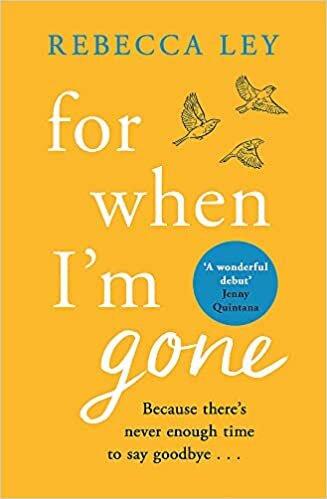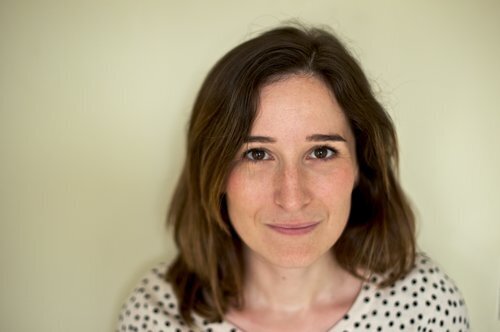We were delighted when Rebecca Ley’s debut novel, For When I’m Gone, came out earlier this month. A heartbreaking story of love and loss, the novel is cleverly narrated through the handbook a young mother writes for her husband, to guide him after she’s gone.
Rebecca is not just a novelist but a successful journalist and mother of three, so we were thrilled when she found time to answer our questions about her writing journey.
Emily Pedder: ‘When did you first realise you wanted to be a writer’?
Rebecca Ley: ‘The day I realised that it was something you could do. I loved reading more than anything. I hope this doesn’t sound too pretentious but no other art form has ever reliably afforded me the same glimpse of transcendence as reading good writing - for me, it’s like plugging into the matrix. I find it harder to get that from music or visual art. So I always saw attempting it myself as the absolute ideal. But as I grew up, I understood how hard it was (and is!) to make a living from writing fiction, so I deliberately went into journalism, which has mostly proven a very varied and interesting career. They are very different disciplines, but I love them both.’
EP: ‘Is For When I’m Gone your first attempt at a novel?’
RL: ‘No. I did the Faber Academy course in 2012 and wrote the first draft of a novel about a newspaper, based on my experience of working on one. I got to 80,000 words but it wasn’t right, I knew it, so I bottom drawered it and got swept up in mothering infants. It’s unbelievably easy to let life get in the way.’
EP: ‘How was the process of writing the novel? Did it come easily or did it take time to find your voice and flow?’
RL: ‘In 2017 I sat down again and started what was to become For When I’m Gone. Part of the issue with my first book had been not feeling like it was in my authentic voice. So I was very deliberate about creating something that was. Not that my main protagonist is anything like me, just that the tone of the book felt right. I kept the sphere closer too, which felt truer to my own tastes. With those things in mind, it flowed much more naturally. I still had doubts - I don’t think any writer is ever completely sure about something they are working on. But it felt like ‘me’ and I realised how crucial that was.’
EP: ‘Who were your favourite authors as a child?’
RL: ‘Margaret Mahy and Dianna Wynne Jones. The thought of their books still gives me a kind of yearning feeling. I love a bit of magical realism, especially in an otherwise mundane situation. I wrote an entire dissertation about Iris Murdoch’s use of it!’
EP: ‘If you could give your younger writing self some advice, what would it be?’
RL: ‘Not to worry so much about narrative perspective. I was so hung up on whether I should use an omniscient narrator, or a closed third or first person. Obviously it’s an important decision, but not one that should let you get in the way of actually making a start. You can always change your mind at a later date and mix it up within a novel. As you write, the right form becomes clearer.’
EP: ‘What would you have done if you hadn’t become a writer?’
RL: ‘If I wasn’t doing any form of writing - so I wasn’t a journalist either - I may well have gone into law. More through a lack of imagination than anything else - it’s the kind of respectable professional choice open to you as an English graduate. But I think it’s for the best that I didn’t. I’d almost certainly be richer, but I’m pretty sure corporate office life would make me profoundly unhappy.’
Rebecca Ley, author of For When I’m Gone
EP: ‘How have you found combining motherhood with writing?’
RL: ‘Until you have childcare, I think it’s pretty impossible to write regularly. Or at least, it was for me personally. Your days are just so absorbed with looking after these tiny beings, your nights are so fractured. But once I found childcare, I have actually found motherhood quite an inspiration in terms of subject matter and motivation. That said, it can feel like there are too many browser tabs open in your mind at all times. And I find it very difficult to do any writing at all if they’re in the house. If they’re near, even if someone else is looking after them, they have the pull of my attention. The only time I can manage it if I start writing first thing, with a cup of tea, before engaging. Sometimes I can fool myself that they don't exist for an hour or two.’
EP: ‘What inspired you to come up with a narrator who’s already dead in For When I’m Gone?’
RL: ‘For When I’m Gone started as a ghost story. Haunting presented itself as a metaphor for motherhood. I used to trudge around my house, picking up discarded sippy cups and toys, feeling almost like I was haunting my own life. Which isn’t to say that I was unhappy, because I wasn’t - or not predominantly - but just that mothering involves absenting yourself, in a sense. Your desires and ambitions are no longer centre stage. Which is a weird transition, particularly in our society perhaps, but also has tremendous upsides. It can be a lovely relief not to think about yourself all the time.'
Over time, the ghost story element of Sylvia’s life was largely curtailed (although there is still a hint if you look for it!) but the sense of a narrator who is already dead remained. It was important to me that those parts are written in the present tense, in that manual form. She’s dead, you know she is - but she’s right there.
Dying is so weird - how can someone, with all their aspirations and joys and petty jealousies, cease to exist? I wanted to look at that. I was writing obituaries for my day job at the time, so the incomprehensible inevitability of non-existence was very much to the forefront of my mind!’
EP: ‘What’s the most important lesson you’ve learned as a writer?’
RL: ‘In terms of writing a novel, it’s crucial to get words on the page. You can go back and rework, but you have to get them out first. Don’t judge what you’re producing harshly - that’s for later. But there’s a caveat and that’s that you also have to try and articulate the mood of your book, even if the early stages. It can just be a feeling, an ache in your chest, that you are trying to write towards.
The other lesson has been how much of writing happens in your subconscious. Things you don’t expect will intrude and you should let them.’
EP: ‘What are you working on now?’
RL: ‘I’m ghosting the memoir of a remarkable man called Hassan Akkad. He’s a Syrian refugee and Bafta-winning filmmaker who volunteered to work as a hospital cleaner when the pandemic hit. He then persuaded Boris Johnson to extend the bereavement scheme to cleaners, porters and healthcare assistants after they were initially excluded. He’s so inspiring; it’s a complete privilege to help him tell his story.
I’m also working on my second novel for Orion.’
Thank you so much, Rebecca! We wish For When I’m Gone all the luck in the world.



